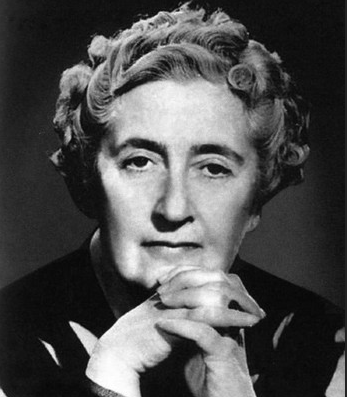Agatha Christie bibliography
 Agatha Christie |
||
| Releases | ||
|---|---|---|
| ↙Novels | 73 | |
| ↙Collections | 28 | |
| ↙Poems | 3 | |
| ↙Plays | 16 | |
| ↙Broadcast works | 7 | |
| ↙As editor | 1 | |
| ↙Autobiography | 2 | |
Agatha Christie (1890–1976) was an English crime novelist, short story writer and playwright. Although she wrote six romance novels under the pseudonym Mary Westmacott, her reputation rests on the 66 detective novels and 14 short story collections that she wrote under her own name, which have sold over two billion copies—an amount only surpassed by the Bible and the works of William Shakespeare. Her works contain several regular characters with whom the public became familiar, including Hercule Poirot, Miss Marple, Tommy and Tuppence Beresford, Parker Pyne and Harley Quin. Christie wrote more Poirot stories than any of the others, even though she thought the character to be "rather insufferable". Following the publication of the 1975 novel Curtain, Poirot's obituary appeared on the front page of The New York Times. The literary historian Howard Haycraft considered that "few fictional sleuths can surpass the amazing little Belgian—with his waxed moustache and egg-shaped head, his inflated confidence in the infallibility of his 'little grey cells', his murderous attacks on the English language—either for individuality or ingenuity."
Christie was born into a wealthy upper-middle-class family in Ashfield, Torquay, Devon. She met her future husband just before the First World War; after he was sent to the Western Front, she worked with the Voluntary Aid Detachment, and in the chemist dispensary, giving her a working background knowledge of medicines and poisons. Christie's writing career began during the war after she was challenged by her sister to write a detective story; she produced The Mysterious Affair at Styles, which was turned down by two publishers before it was eventually published in 1920. Following the limited success of the novel, she continued to write and steadily built up a fan base for what Contemporary Authors calls "her unfailingly clever plots". She went on to write over a hundred works, including further novels, short stories and plays. Additionally she wrote two volumes of poetry, two autobiographical books and six romantic works under the pseudonym Mary Westmacott. One of Christie's plays, The Mousetrap, opened in West End theatre in 1952 and, as at September 2015, was still running; in 2009 the London run exceeded 25,000 performances. In September 2015 a public vote identified And Then There Were None—originally published in 1939 under the name Ten Little Niggers—as the public's favourite Christie novel; the book was the writer's favourite, and the one she found most difficult to write.
...
Wikipedia
